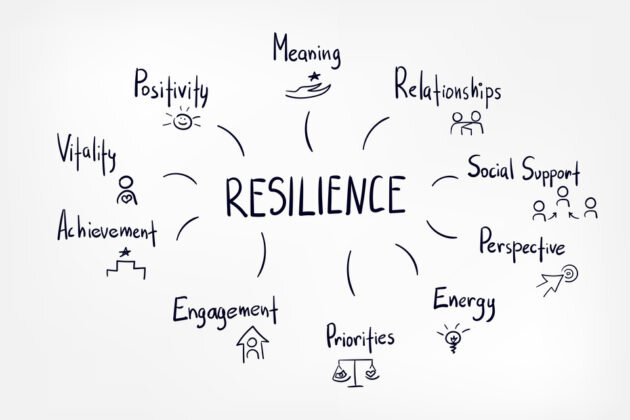RESILIENCE
Psychologists define resilience as the process of adapting well in the face of adversity, trauma, tragedy, threats, or significant sources of stress—such as family and relationship problems, serious health problems, or workplace and financial stressors.
“Who goes through all that hell to be mediocre?”
The Importance of Resilience
Resilience and the Brain
Given the high prevalence and burden of mental disorders, fostering the understanding of protective factors is an urgent issue for translational medicine in psychiatry. The concept of resilience describes individual and environmental protective factors against the backdrop of established adversities linked to mental illness. There is convergent evidence for a crucial role of direct as well as indirect adversity impacting the developing brain, with persisting effects until adulthood. Direct adversity may include childhood maltreatment and family adversity, while indirect social adversity can include factors such as urban living or ethnic minority status. Recently, research has begun to examine protective factors which may be able to buffer against or even reverse these influences. First evidence indicates that supportive social environments as well as trait-like individual protective characteristics might impact on similar neural substrates, thus strengthening the capacity to actively cope with stress exposure in order to counteract the detrimental effects evoked by social adversity.
Resilience and Gratitude
The Relationship Between Resilience And Gratitude. Gratitude fosters adaptive coping mechanisms. By managing positive emotions like satisfaction, happiness, and pleasure, gratitude enhances our emotional resilience and builds our inner strength to combat stress.
Source: (Gloria & Steinhardt, 2016)
Resilience and Trauma
What researchers have found is that prolonged exposure to stress and adverse experiences damages people, and the consequences continue long after the stress and aversive experiences stop (Shore, 2019). Additionally, research shows people who have experienced trauma are two times more likely to develop depression, three times more likely to be absent from work or school, and three times more likely to develop anxiety disorder.
Resilience and Compassion
Compassion is the ongoing practice of relating to yourself and others kindly and fairly. It is especially helpful during times of stress and suffering. Compassion is not kicking yourself or others when you’re down, which prolongs stress reactions, creates more suffering, and delays your ability to get back up and help others get back up. Instead, compassion is about treating yourself as you would treat a good friend in distress. It is about responding with caring support. Compassion increases well-being and resilience to stress and trauma. It has also been linked to healthier behaviors (like more exercise and less substance use), greater motivation, confidence, and a sense of personal responsibility. It also improves our pro-social or supportive relationship behaviors. Practicing mindfulness, self-kindness, and understanding common humanity are keys to having more compassion in your everyday life.
Resilience and Emotional Intelligence
There are real health and wellness benefits to being resilient. It's something worth striving for if you aren't already that way. Importantly, resilience is a learnable skill. Most anyone can become more emotionally resilient if they work at it. Growing in emotional resilience requires that you work towards greater self-knowledge. For example, it is important that you learn to identify how you react in emotional situations. Knowing how you react when stressed helps you gain better control over those reactions. A good framework to help guide you towards becoming more aware of your emotions is something called Emotional Intelligence.
More About Resilience
Mayo Clinic
.Resilience is the ability to adapt to difficult situations. When stress, adversity or trauma strikes, you still experience anger, grief and pain, but you're able to keep functioning — both physically and psychologically. However, resilience isn't about putting up with something difficult, being stoic or figuring it out on your own. In fact, being able to reach out to others for support is a key part of being resilient. Resilience can help protect you from various mental health conditions, such as depression and anxiety. Resilience can also help offset factors that increase the risk of mental health conditions, such as being bullied or previous trauma. If you have an existing mental health condition, being resilient can improve your coping ability.
American Psychological Association
Life may not come with a map, but everyone will experience twists and turns, from everyday challenges to traumatic events with more lasting impact, like the death of a loved one, a life-altering accident, or a serious illness. Each change affects people differently, bringing a unique flood of thoughts, strong emotions and uncertainty. Yet people generally adapt well over time to life-changing situations and stressful situations—in part thanks to resilience.Becoming more resilient not only helps you get through difficult circumstances, it also empowers you to grow and even improve your life along the way.
Association For Applied Sport Psychology
A common occurrence that all athletes encounter is performance errors. All athletes make mistakes; it is a natural part of learning to be competent at any activity. Since mistakes are normal, it is beneficial to help athletes accept that errors will occur in sport.
Simply stated, resilience is the ability to remain composed, confident, and consistent in the face of errors. A resilient athlete is one who can let go of errors and return to the present; s/he uses the error as an opportunity to learn and improve. The athlete who is not resilient will dwell on the mistake, be unable to stay in the present, and his/her performance will be inconsistent.










